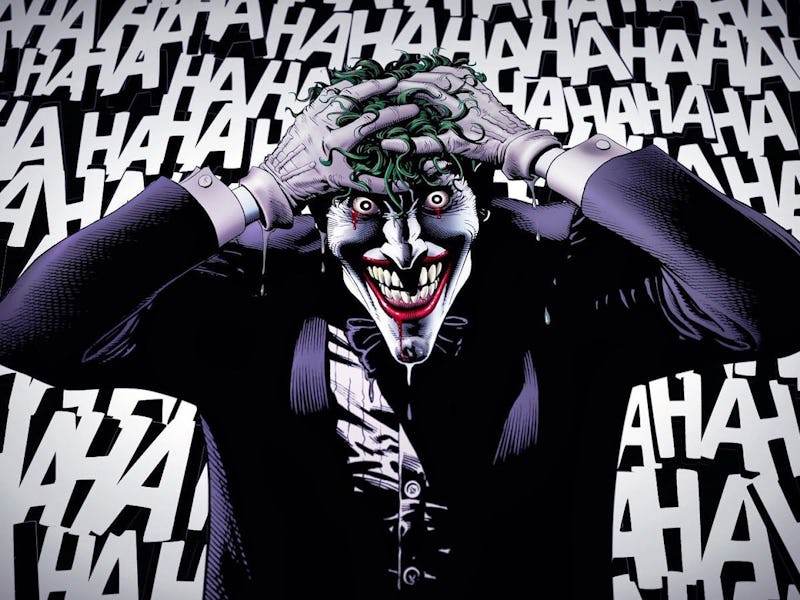Alan Moore Has A Lot To Say About 'The Killing Joke'
“I don’t think the world needs that many psychopathic brooding avengers."

Notorious angry wizard Alan Moore has a lot of thoughts on superhero fiction. If you’ve ever had a chance to see how Moore scripts his comic books, you’ll know that they are less “panel by panel” plans and more letters of philosophy he sends to an artist. If he has this many thoughts about crafting a piece, you know he has even more to say about their reception and legacy. With the new DC animated feature The Killing Joke coming out (and looking very not great), the internet is looking back at a history of Moore’s views on the one-shot comic.
At 64 pages, the single issue comic remains one of the most influential and dark moments in all of The Caped Crusader’s history, and it’s known for including some psychologically and sexually disturbing content which forever altered the story’s characters. There is also a long-running debate about the meaning of the final frames and whether or not it is implied that Batman kills The Joker for his crimes. There’s a lot here to dip into, and that’s good, because a 64 page source material isn’t nearly enough to make a feature length film without taking some liberties. If we’re going to start changing Moore’s work, we should first know how he feels about the material.
From an interview at now-dead site Mania.com:
I’ve never really liked my story in The Killing Joke. I think it put far too much melodramatic weight upon a character that was never designed to carry it. It was too nasty, it was too physically violent. There were some good things about it, but in terms of my writing, it’s not one of me favorite pieces. If, as I said, god forbid, I was ever writing a character like Batman again, I’d probably be setting it squarely in the kind of “smiley uncle period where Dick Sprang was drawing it, and where you had Ace the Bat-Hound and Bat-Mite, and the zebra Batman—when it was sillier. Because then, it was brimming with imagination and playful ideas. I don’t think that the world needs that many brooding psychopathic avengers. I don’t know that we need any. It was a disappointment to me, how Watchmen was absorbed into the mainstream. It had originally been meant as an indication of what people could do that was new. I’d originally thought that with works like Watchmen and Marvelman, I’d be able to say, “Look, this is what you can do with these stale old concepts. You can turn them on their heads. You can really wake them up. Don’t be so limited in your thinking. Use your imagination.” And, I was naively hoping that there’d be a rush of fresh and original work by people coming up with their own. But, as I said, it was meant to be something that would liberate comics. Instead, it became this massive stumbling block that comics can’t even really seem to get around to this day. They’ve lost a lot of their original innocence, and they can’t get that back. And, they’re stuck, it seems, in this kind of depressive ghetto of grimness and psychosis. I’m not too proud of being the author of that regrettable trend.
From a more recent Q&A at Goodreads, Moore had this to say:
As with all of the work which I do not own, I’m afraid that I have no interest in either the original book, or in the apparently forthcoming cartoon version which I heard about a week or two ago. I have asked for my name to be removed from it, and for any monies accruing from it to be sent to the artist, which is my standard position with all of this…material. Actually, with The Killing Joke, I have never really liked it much as a work – although I of course remember Brian Bolland’s art as being absolutely beautiful – simply because I thought it was far too violent and sexualised a treatment for a simplistic comic book character like Batman and a regrettable misstep on my part. So, Pradeep, I have no interest in Batman, and thus any influence I may have had upon current portrayals of the character is pretty much lost on me. And David, for the record, my intention at the end of that book was to have the two characters simply experiencing a brief moment of lucidity in their ongoing very weird and probably fatal relationship with each other, reaching a moment where they both perceive the hell that they are in, and can only laugh at their preposterous situation. A similar chuckle is shared by the doomed couple at the end of the remarkable Jim Thompson’s original novel, The Getaway.
What’s the takeaway? Moore doesn’t love his impact, in general, or the way his comics introduced heavy, brooding philosophies into superhero fiction. He also sees the characters as being far too thin to carry all this melodrama. What does Moore wish he had done instead? We have no idea. But considering he has a one-million word poem coming out, he probably doesn’t have strong feelings about Mark Hamill’s voiceover performance of a decades old comic book he once scripted.